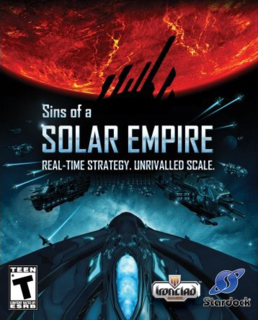What Master of Orion III should have been.
Graphics are on par with games from a year or two ago, however, considering the vast level of detail in the game it's easy to forgive and look past some of the graphical undershots. For instance - planet's look alive and wild, however, you can still see the mapped terrain and landscape - some pixelated spots even on the highest detail, but they're still pretty. And the developer has also included planetary vehicular traffic that adds to the atmosphere of a spaceworld. The spacescapes are huge and convincing. Ultimately the graphics are very pretty and balanced very well - it's just hard to look back to these graphics after playing games like Crysis and Company of Heroes. Nothing to knock the dev's for.
Gameplay doesn't go too fast nor too slow. There are several optional gameplay setups for several different size maps. As stated you can scroll all the way out to the galaxy level and all the way in to the orbit of a given planet. If you zoom all the way in to view one of your units it is pretty and moves as you would expect of starships and fighters to move. The balance between the three sizes of ships is very well done. Fighters and bombers are effective, balanced, and fun to use. Capital ships and frigates are also well kept. The only thing I would have wanted was a custom ship builder option like previous Stardock games have had. However, your capital ships can level up and you can customize the options of each capital ship in a limited fashion. There are a few options different for each capital ship and each design is different. Ultimately you would level up each ship and each copy of the specific design would have the same end result. During combat shields flare and give to incoming projectile, beam, and laser weapons. There are flak frigates and ecm upgrades to help against some of these weapons. The planetary customization is fairly deep, although I would have liked to see some more options insofar as ground structures and ground based warfare - specifically that there is no ground based warfare.
You can explore and colonize the galaxy peacefully but ultimately you'll end up in a fight as the other factions during the game will request you to start a neighborhood brawl with their opponents. And if you don't they'll treat you as an enemy. If it sounds too pinching you can always save and reload the mission and reset the difficulty of each of the AI's in the game.
There are three resources during the game that you will use - taxes collected from your peeps, metal mined from asteroids, and crystal also mined from asteroids. If you can't get enough metal or crystals and you have more than enough green, or gold as it is in the game, you can use your funds to purchase metal or crystals on the black market. However, supply and demand rules apply and the price will go up as demand does as well.
There is a research tree that is split into four groups; military, civil, fleet (logistical), or artifacts. Most of your research will be of military or civil means which drives the game's tech tree. However, you must also research logistical statuses to increase your fleet size capability as well as any artifacts that you glean from the planets surface. In the end the balance is staggering.
The strategic setup of your planets systems is just as important as any other aspect of the game. The enemy can enter your system from certain points so you can set up defenses but you only get a certain amount of tactical source points to use for each system. This gives you choices for each system and also limits the gameplay to a perfect balance of offense vs. defense.
In review, Galactic Civilizations was a great game but what is lacked in intricate gameplay Stardock made up for with Sins of a Solar Empire. The game isn't quite as deep technologically or developmentally but what it lacks for in this category (which isn't much) is greatly makes up for with action on a real-time-strategy galactic scale. This is the first real attempt at this genre as the past greats were turn based only - the king of which still stands tall after 12 long years - Master of Orion II. If you're looking for a legitimate step in the right direction, Sins of a Solar Empire isn't a risk, it's a reward.

